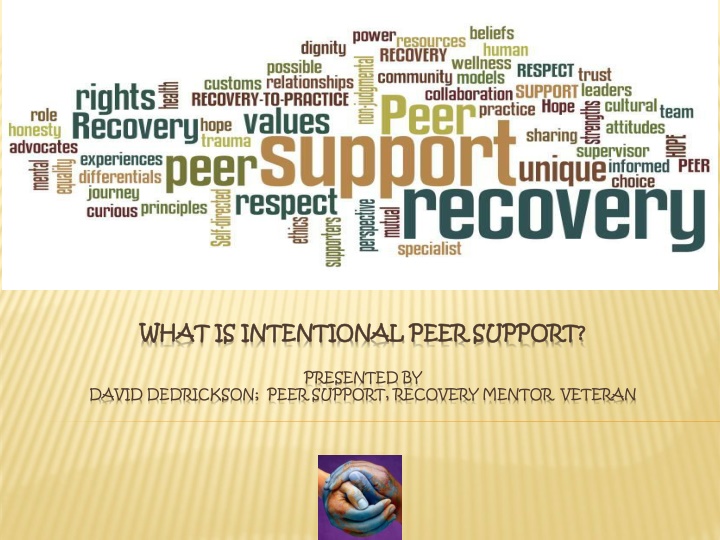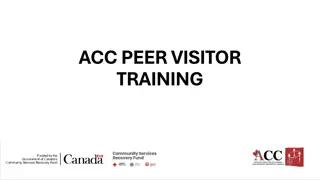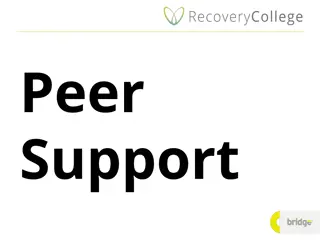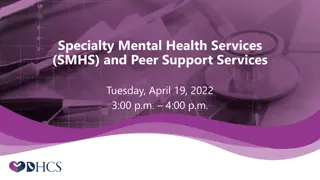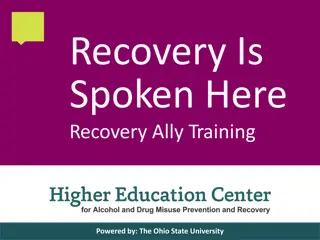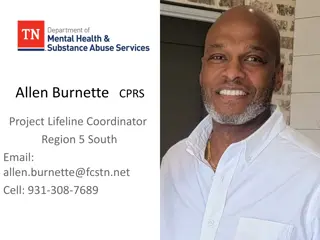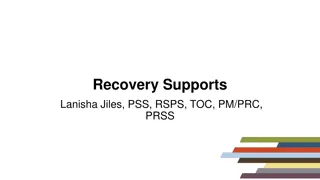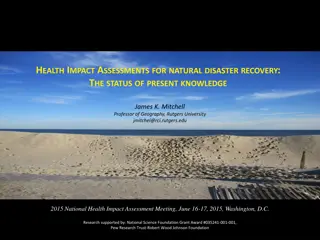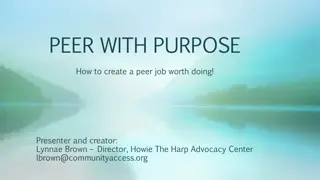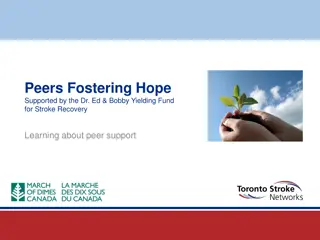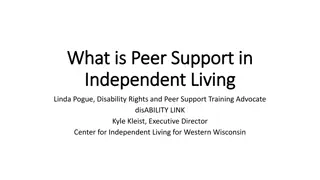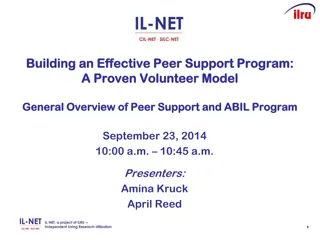Intentional Peer Support and its Importance in Mental Health Recovery
Intentional Peer Support, presented by David Dedrickson, emphasizes purposeful relationships where individuals support and challenge each other to explore new perspectives and behaviors. It involves peer-to-peer interactions based on shared experiences, offering a unique form of support different from traditional services. Peers listen, provide guidance, and encourage self-reflection without the constraints of medical models or diagnoses, fostering a trauma-informed approach that focuses on understanding personal narratives and creating new ways of thinking and doing.
Download Presentation

Please find below an Image/Link to download the presentation.
The content on the website is provided AS IS for your information and personal use only. It may not be sold, licensed, or shared on other websites without obtaining consent from the author.If you encounter any issues during the download, it is possible that the publisher has removed the file from their server.
You are allowed to download the files provided on this website for personal or commercial use, subject to the condition that they are used lawfully. All files are the property of their respective owners.
The content on the website is provided AS IS for your information and personal use only. It may not be sold, licensed, or shared on other websites without obtaining consent from the author.
E N D
Presentation Transcript
WHAT IS INTENTIONAL PEER SUPPORT? WHAT IS INTENTIONAL PEER SUPPORT? PRESENTED BY DAVID DEDRICKSON; PEER SUPPORT, RECOVERY MENTOR VETERAN
BIG CLINICAL DEFINITION: Intentional P eer S upport is a way of thinking about purposeful relationships. It is a process where both people (or a group of people) use the relationship to look at things from new angles, develop greater awareness of personal and relational patterns, and to support and challenge each other as we try new things.
WHAT IS A PEER A peer A peer is someone who has been there. P eople with similar experiences may be able to listen, give hope and guidance toward recovery in a way that is different, and may be just as valuable, as professional services C an you think of examples of what a peer means to you C an you think of examples of what a peer means to you
WHAT PEER SUPPORT IS NOT: It is not about providing treatment It is not about taking care of someone or being a paid friend. It is not based on psychiatric/ medical models or diagnoses
WHAT PEER SUPPORT IS P eer support is about both giving and receiving It is trauma-informed, recognizing the value of exploring "what has happened to you?" P eer support encourages each of us to re-evaluate how we've come to know what we know It is about creating relationships that we can use to take a bigger-picture look at how we have learned to operate in the world and what we want.
IPS IS DIFFERENT FROM TRADITIONAL SERVICE RELATIONSHIPS BECAUSE: It doesn t start with the assumption of a problem. Instead people are taught to listen for how how and why why each of us has learned to make sense of our experiences, and then use the relationship to create new ways of seeing, thinking, and doing.
IPS IS DIFFERENT FROM TRADITIONAL SERVICE RELATIONSHIPS BECAUSE: IP S : P romotes a trauma trauma- -informed informed way of relating- instead of asking what s wrong we think about what happened what happened ?
IPS IS DIFFERENT FROM TRADITIONAL SERVICE RELATIONSHIPS BECAUSE: IP S : looks beyond looks beyond the notion of individuals needing to change and examines our lives in the context of our relationships and communities.
IPS IS DIFFERENT FROM TRADITIONAL SERVICE RELATIONSHIPS BECAUSE: P eer S upport relationships are viewed as partnerships partnerships that enable both parties to learn and grow- rather than rather than as one person needing to help another.
IPS IS DIFFERENT FROM TRADITIONAL SERVICE RELATIONSHIPS BECAUSE: Instead of a focus on what we need to stop or avoid doing, we are encouraged encouraged to move towards what and where we want to be.
FROM HELPING TO LEARNING L earning versus helping: building a relationship where both people learn and grow, rather than one person helping the other (or taking it in turns to help each other). T his changes the dynamics of the relationship - both are there to learn, not to "fix problems." L earning versus helping: IP S is specifically about
FROM INDIVIDUAL TO RELATIONSHIP Individual versus R elationship: Individual versus R elationship: R ather than focus on one person (usually the one who has "problems"), IP S specifically shifts the focus to the relationship. E ach person is encouraged to be present to the other and to engage in a way that is real. T his also encourages a shift away from "helping" to both people using the relationship to learn more about themselves and their relationships.
FROM FEAR TO HOPE F ear versus H ope and possibility: F ear versus H ope and possibility: IP S is about approaching discomfort and fear in new ways new ways. R ather than operating from a place of fear, we operate from a place of hope. T his hope is underpinned by the knowledge that there is learning to be gained by moving through discomfort learning to be gained by moving through discomfort.
FOUR CENTRAL TASKS IN INTENTIONAL PEER SUPPORT C onnection 1 . W orldview 2 . M utuality 3 . M oving T oward 4.
CONNECTION: C onnection: C onnection: C onnection is the core of peer support C onnection is the core of peer support. It is the powerful sense when we realize that someone else "gets it." It is the beginning of building trust. B ut the connection isn't permanent - we have to work at it; when we notice disconnection, we need to be willing to explore what's happening.
WORLD VIEW: W orldview: W orldview: T hrough honest connection we can then explore with each other, seeking to understand how we have come to know what we "know." T ogether, we look at how we make sense of what's going on, and learn to sit with the differences in our worldviews. T his process may challenge us to rethink our ideas and the "stories" we tell ourselves.
MUTUALITY: M utuality: M utuality: In a relationship based on IP S principles, both people learn, grow and are challenged through the relationship. M utuality is not to be confused with reciprocity - people taking it in turns to help each other. M utuality means being in relation with another person, while staying present and aware of our own reactions, worldview, needs and assumptions.
MOVING TOWARD: M oving T owards: M oving T owards: Instead of thinking about moving away from our problems (and what we don't want), in IP S each person in the relationship reflects on what we want to move towards. O ften, in mental health, focusing on our problems keeps us stuck.
MOVING TOWARD - (CONTINUED): It's important to note that this task is not just about "positive thinking" or "problem solving," but builds on the work in the other steps - the mutuality and real connection of the relationship, and thoughtfully reconsidering our worldview and how we have come to know what we "know" about ourselves and the world. In some ways, this last task arises naturally out of the other In some ways, this last task arises naturally out of the other three three - - the tasks are in order for good reason! the tasks are in order for good reason!
It is one of the most beautiful compensations in life that no man can sincerely try to help another without helping himself. Ralph Waldo Emerson [Peer support] has helped me to have hope and faith. [Peer support] has helped in my optimism toward life again and has helped me cope successfully with family matters and many others. Quote from a consumer who received peer support.
SUMMARY S o all in all, intentional peer support is a way of life; a way of communicating that honors individual experience as well as relational growth. It is a system of giving and receiving that ultimately helps us build healthier communities all the way around.
